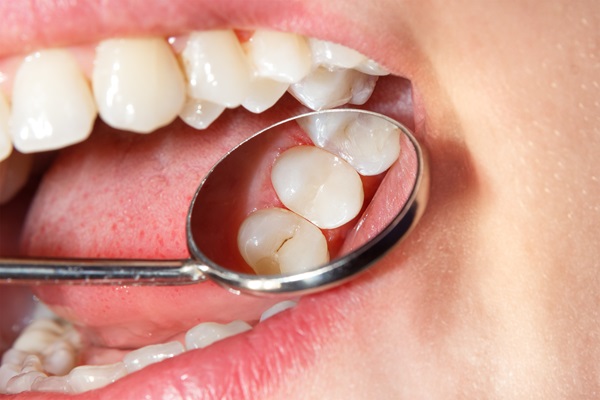When a Dental Crown Is Needed for a Cavity

A dental crown is often used to treat dental cavities, especially when the cavity is too large or too deep for a dentist to repair with a dental filling. This review provides a detailed look at when a dental crown is needed to repair a tooth that has a cavity and how a dental crown compares with other cavity restoration solutions.
When is a dental crown necessary for cavity treatment?
By learning more about dental crown treatment for a cavity, you can make a more informed decision as to whether or not a dental crown (or another form of restoration) is most appropriate for your oral health needs and goals.
The purpose of a dental crown
A dental crown is used to repair a tooth that is damaged. It is a flexible type of dental restoration that can repair many types of teeth damage, including but not limited to chips, cracks, worn-down teeth from bruxism, and dental cavities. There are different types of dental crowns. Notably, the most common types are a ceramic crown, metal crown, porcelain-fused-to-metal crown, and gold alloy crown. Each option offers unique pros and cons to consider.
Dental crown vs. dental filling
A dental filling is perhaps the most common type of cavity treatment. However, a filling is typically only an option if the tooth damage is minor. If the cavity is larger, then a dental crown is more likely necessary. In addition, a root canal procedure may be necessary if the tooth decay extends to the root of the tooth. A dental crown is typically placed after a root canal procedure to ensure the long-term support and strength of the tooth (see below).
Dental crown vs. root canal treatment
Root canal treatment involves the removal of decay inside the root of the tooth. The cavity is then filled with gutta-percha (a healthy material that is better at filling larger cavities). Dentists often recommend root canal treatment for cavities that are too large for a dental filling. After a root canal procedure, the dentist can then place a dental crown to protect the tooth long-term.
Dental crown vs. tooth extraction
Tooth extraction is often the last resort when treating a cavity, and it is generally only recommended if the tooth cannot be saved by root canal therapy or another restorative procedure. For example, if the support of the tooth is weakened by periodontal disease, then the placement of a dental crown is not likely going to be enough to save the tooth from becoming lost.
How does dental crown placement work?
The dental crown placement process has never been easier for patients. The process involves preparing the tooth, which may involve removing a small amount of enamel to make room for the crown, followed by taking a dental impression. The impression is then sent to the laboratory where it is customized for the optimal size and fit. Once the crown arrives back at the dentist’s office, the crown is then placed. While awaiting the permanent crown, the dentist can place a temporary crown.
FAQs about dental crown placement
It is best to ask questions that you have about dental crown placement with a licensed dentist during a consultation visit. The following are two common questions (and answers) that dentists receive about crowns for cavity treatment.
Is the placement of a dental crown invasive?
The invasiveness of dental crown placement depends on the specifics of your situation. For example, a patient that requires a root canal may have a more invasive process. However, in most cases, the procedure does not cause much discomfort. There may be some minor discomfort while the tooth is prepared as well, but the placement of the crown is painless for most patients.
How long can I expect my dental crown to last?
This depends on several factors, including how well you care for your crown and the type of crown material; a metal crown (or porcelain-fused-to-metal crown) is likely to last longer than a ceramic crown. On average, crowns last between 10 and 15 years. In some cases, patients wear their crown for more than 20 years.
A dental crown for a cavity can save your tooth
No one should have to live with a severe dental cavity that causes discomfort. Here at our dental practice, we can help save your tooth and relieve the discomfort by placing a dental crown, or by using a similar restoration that is appropriate and meets your treatment needs and preferences.
Request an appointment here: https://www.smilesinpa.com or call Jenny Chen Pediatric and Family Dentistry at (610) 400-1588 for an appointment in our West Grove office.
Check out what others are saying about our dental services on Yelp: Dental Crown in West Grove, PA.
Recent Posts
If you've suffered a broken or damaged tooth, you may want to consider a dental crown to restore your damaged smile. It's important, however, to know when your crown is getting worn and when it is time to get it replaced so that you can keep your smile looking its best. Proper maintenance and care…
When someone has had a root canal, people usually think of a dental crown as the next procedure. During a root canal, the dentist first drills a tiny hole in the tooth's surface. The infected pulp is then removed, and the inner layer of the tooth is cleaned to remove any residue. Finally, the dentist…
Dental crowns are supposed to last forever, right? In the right set of circumstances, they could. Some crowns will last several decades while others will last a lifetime. Then there is the dental crown that comes loose for one reason or another. A loose crown means that a trip to the dentist is in the…
There are certain steps that dentists follow to ensure the safety and quality of dental crown treatment. This review discusses the steps that are typically involved with the dental crown procedure.The dental crown procedure typically involves an evaluation of the damage, followed by trimming the tooth and the placement of a temporary crown. A dental…


